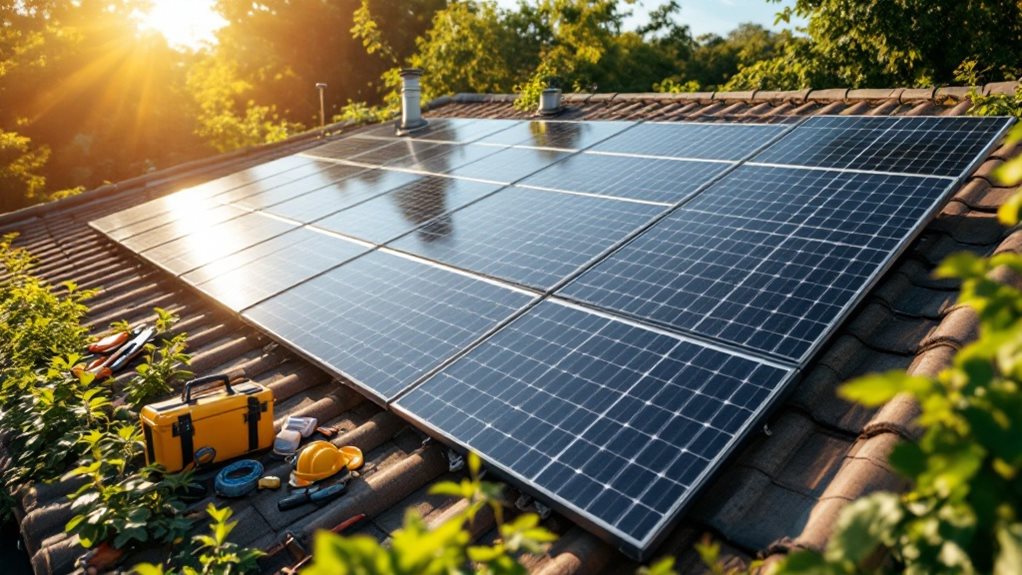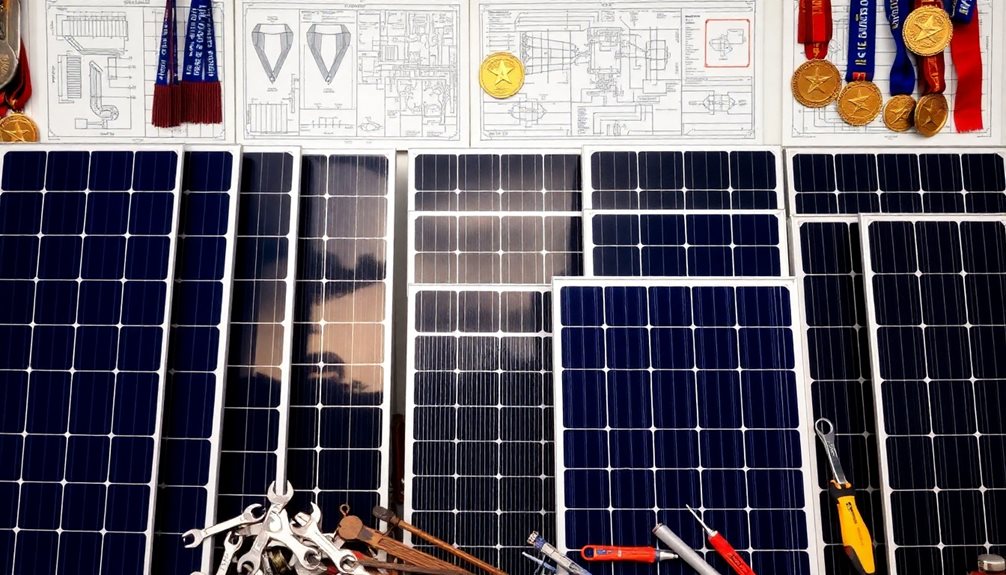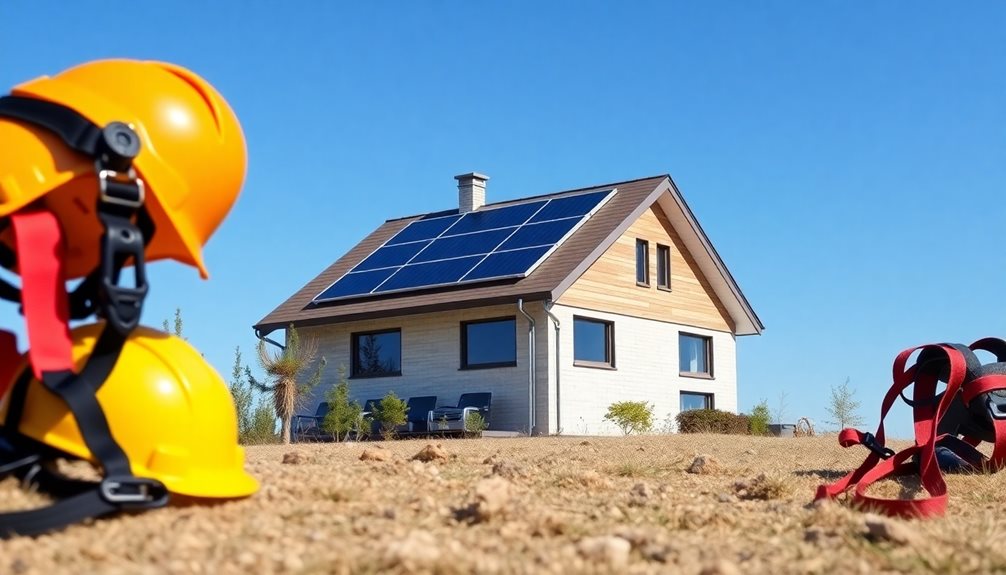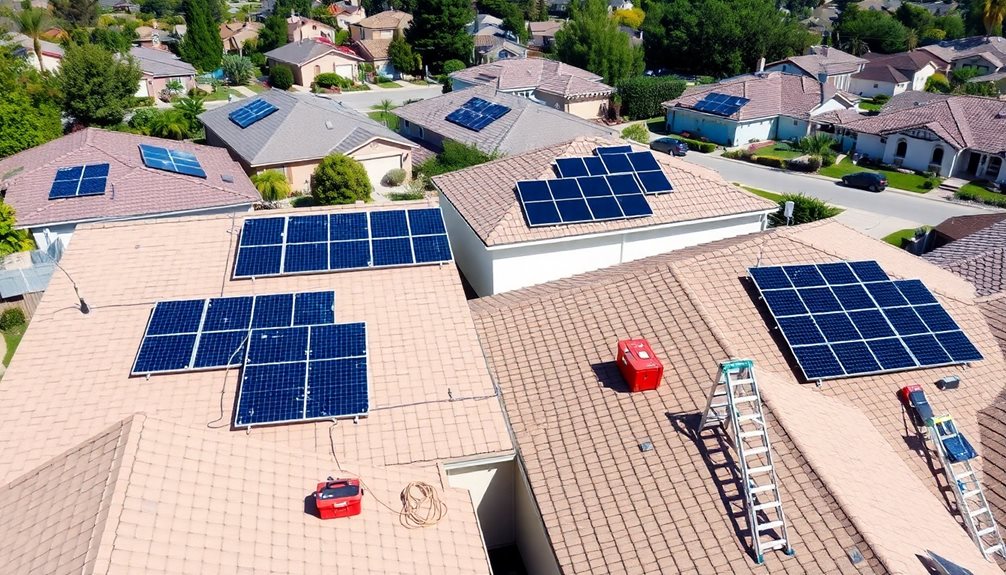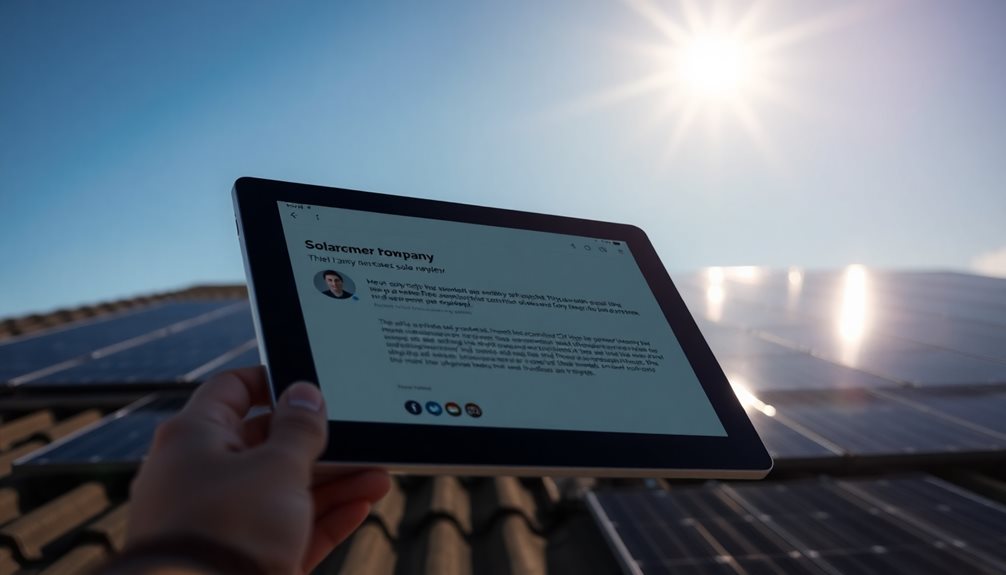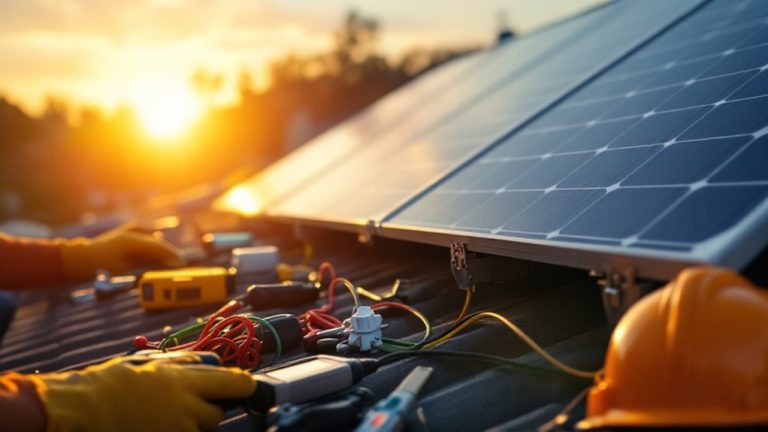Choosing the right solar panel installation contractor requires careful consideration of several critical factors to guarantee effective and safe implementation. Begin by evaluating the contractor's experience, particularly their understanding of local conditions and compliance with industry standards and recognize certifications like NABCEP. Verify they possess the necessary state and national licenses, such as the C-46 in California. Acquire multiple cost estimates, bearing in mind that extremely low bids might indicate insufficient expertise. Investigate the thoroughness of warranty packages offered and validate their insurance coverage including liability and workers' compensation. Exploring these aspects will further refine your decision-making process.
Expert Highlights
- Evaluate the contractor's experience and reputation, with a focus on local expertise and positive reviews.
- Ensure the contractor holds necessary state-specific licenses and national certifications for solar installations.
- Compare multiple cost estimates, paying attention to cost per watt and exercising caution with unusually low bids.
- Prioritize contractors offering comprehensive warranties, especially those that exceed the 25-year industry standard.
- Verify that the contractor has proper insurance coverage and adheres to stringent safety protocols.
Evaluate Experience and Reputation
When considering solar panel installation, evaluating a contractor's experience and reputation is essential for ensuring a successful project outcome. Select a company seasoned in diverse installation types, with a solid track record and extensive knowledge of local conditions. Contractors with local expertise are invaluable as they are familiar with the weather conditions and building codes specific to the area, ensuring compliance and optimized solar system performance. Investigate online reviews, testimonials, and references to ascertain their community standing. A contractor's adherence to industry standards and recognition signifies reliability and community belonging, fostering trust.
Verify Licensing and Certifications
Guaranteeing compliance with licensing and certifications is pivotal for a successful solar panel installation project. Federal regulations dictate each state's contractor licensing standards, requiring adherence to the National Electrical Code. Some states, like Arizona and Texas, require specific electrical contractor licenses for solar installations, emphasizing the need to thoroughly understand local licensing requirements. Understanding state-specific licenses, such as California's C-46 or Florida's EC, and national certifications like NABCEP's, secures your contractor meets high industry standards. Always verify local licensing and certifications to protect your investment and guarantee quality installation.
Gather Cost Estimates
After verifying licensing and certifications, the next step involves gathering cost estimates to understand the financial scope of your solar installation project. Obtain multiple quotes for cost clarity, considering the national average and cost per watt. Solar panel installations, on average, cost $21,816 before incentives. Exercise caution with low bids and evaluate each installer's expertise and reputation.
| Estimate Type |
Cost (USD) |
Note |
| Average System Cost |
$21,816 |
National average cost for 7.2 kW |
| Cost Per Watt |
$2.50 – $3.50 |
Depends on solar installation size |
| Total System Range | $16,500 – $25,000| Varies based on quotes and options
Assess Warranties and Guarantees
Evaluating a solar panel installation's warranty and guarantee offerings is an essential step in securing long-term reliability and protection for your investment. Understanding product, performance, installation, and equipment warranties can safeguard against defects, performance decline, or improper installation. Opt for contractors that offer thorough warranty packages, register warranties diligently, and guarantee regular maintenance to maximize durability. Notably, many systems often exceed the 25-year warranty period when they are properly designed and installed, offering more value and assurance for your investment over time. Prioritize quality installers with robust warranty terms.
Confirm Insurance and Safety
Selecting a contractor with expansive insurance coverage and a critical commitment to safety is essential in ensuring a seamless solar panel installation process. Emphasizing general liability and workers' compensation secures both financial protection and compliance. Safety is fortified through rigorous adherence to electrical, fire, and fall protection protocols, alongside enduring training and PPE usage. It is important to note that a certificate of insurance (COI) is merely temporary evidence of coverage, and to comprehensively understand an installer's protection, one must review the actual policy for detailed terms and conditions. Rigorously verifying insurance documentation guards against unforeseen liabilities and fosters community trust.
Conduct Thorough Research
Engaging in meticulous research is crucial to selecting the right solar panel installation contractor. By prioritizing companies with extensive industry experience, prospective clients establish confidence in service quality.
Evaluating a contractor's reputation through customer reviews and online directories provides insight into their successful installations. Verifying licenses and certifications like NABCEP guarantees professional competency, while consulting local resources clarifies essential licensing requirements, cultivating an informed decision-making process.
Compare Multiple Contractors
Once you've conducted thorough research, the next step is to compare proposals from multiple solar panel installation contractors. Assess their detailed descriptions of materials, equipment, and installation timelines. Verify their licensing, certifications such as NABCEP, and check for NYSERDA "Quality Solar Installer" status.
Evaluate warranties, financing options, insurance coverages, and customer testimonials. Finally, guarantee their value aligns with your financial and quality expectations for a sense of confident belonging.
Analyze Quality and Service
Evaluating the quality and service of potential solar panel installation contractors is essential to ensuring the longevity and performance of your solar investment. Adequate licensing, certification, and experience with similar systems are indispensable.
Prioritize those employing quality components and quality control procedures. Verify extensive insurance coverage. Service reliability hinges on robust warranties, efficient after-sales support, transparent communication, and adherence to transparent contractual obligations.
Read Customer Reviews
How can you guarantee a reliable solar panel installation experience? Reading customer reviews provides essential insights into the quality and reliability of contractors. Consistent positive feedback and high ratings on platforms like Yelp and Google indicate customer satisfaction.
Evaluate service aspects like responsiveness, efficient installations, and problem resolution. Authentic reviews help gauge expertise, communication, and reliability, ensuring your solar needs align with trusted, community-recommended providers.
Understand Local Requirements
Traversing local requirements is essential for a successful solar panel installation. Understanding these intricacies fosters community integration and guarantees compliance.
Engage with streamlined processes for small systems, adhering to local codes.
Align installations with municipal zoning and land use regulations.
Navigate the California Solar Rights Act to avoid unreasonable restrictions.
This approach elevates both community standing and project success.
FAQ
How Do Solar Panel Installations Impact Property Value?
Solar panel installations increase property value by 3% to 4%, offering energy savings and a market premium. Enhanced appeal comes from environmental benefits. Regional factors, ownership, and system size also influence the extent of increased value.
What Environmental Benefits Do Solar Panels Provide?
Solar panels offer significant environmental benefits, including reducing greenhouse gas emissions and air pollution, conserving water resources, and promoting sustainability. They enhance energy independence, improve local air quality, and provide a long-term, renewable energy solution.
Are There Government Incentives for Installing Solar Panels?
Yes, government incentives for solar panel installation include a 30% federal tax credit valid through 2032, decreasing afterward. Homeowners may benefit from state initiatives like sales tax exemptions, property tax exemptions, and rebate programs further reducing costs.
How Do Solar Panels Perform in Different Climates?
Solar panels exhibit varied performance across climates due to factors such as cloud cover, temperature fluctuations, and geographic location. Comprehending regional climate dynamics guarantees optimized panel efficiency, fostering a sustainable energy community and enhancing collective environmental responsibility.
Can Solar Panels Be Installed on All Roof Types?
Solar panels can be installed on most roof types, although some materials like standing metal, asphalt shingles, and composite shingles are more compatible. Conversely, wood and slate roofs pose challenges due to fragility, requiring expert handling.
Experts Final Thoughts
In selecting a solar panel installation contractor, a vast evaluation of experience, reputation, licensing, and certifications is vital. Cost estimates should be painstakingly gathered and compared, while warranties, guarantees, insurance, and safety protocols must be assessed to ascertain optimal protection and peace of mind. In addition, customer reviews offer valuable insights into service quality, and an understanding of local requirements is essential for regulatory compliance. A comprehensive analysis of these factors will enable an informed decision-making process, optimizing the benefits of solar energy investment.





